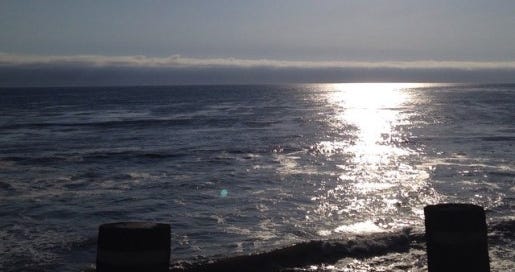"This is the dream we carry through the world"
Olav Hauge, Tales from Moominvalley, and the delights of sharing your favorite poets with your teens
Olav H. Hauge’s book The Dream We Carry is one of my most-reached-for volumes of poetry. So often, when the light is just beginning to glow above the blue mountains at the far edge of my morning view, it’s Hauge’s voice I want to hear.
I was thinking of this and remembering how much Huck and Rilla connected with Hauge when he was our poet of the month in the winter of 2023. They would have been 14 (just barely) and 16 when I wrote a blog post about it, a post I thought worth sharing here. As you’ll see, we were also in the middle of one of our big Moomin binges (practically a way of life around here).
Slip into a harbor, glide into a cove, glide in on a wave
From Bonny Glen:
Hauge’s poem “This Is the Dream” provoked intense discussion—
This is the dream we carry through the world
that something fantastic will happen
that it has to happen
that time will open by itself
that doors shall open by themselves
that the heart will find itself open
that mountain springs will jump up
that the dream will open by itself
that we one early morning
will slip into a harbor
that we have never known.
My copy of The Dream We Carry has the original Norwegian on the verso and the English translation on the recto. Rilla, curled up beside me, enjoyed comparing the two versions. She was struck by the lovely image of the mountain springs “jumping up” and reached for Google Translate’s snapshot feature to compare the literal (and much less poetic) translation. That led to a line-by-line unpacking of the language. The Hauge collection Luminous Spaces has an entirely different translation, and we got really caught up in discussing the figurative and connotative differences between these variants:
…that we one early morning
will slip into a harbor
that we have never known
(from The Dream We Carry, translated by Robert Bly)
and that one morning we’ll glide
into a cove we didn’t know
(from Luminous Spaces, translated by Olav Grinde)
that I one early morning will glide
in on a wave I have never known
(Google Translate’s rendering of the original—interesting that it’s in first person singular, when both English translations use we)
Slip into a harbor, glide into a cove, glide in on a wave—such distinct and potent images, each in their own way.
There are buckets more I could say about our Hauge conversations, but the only one I’ll mention now is the Fillyjonk connection. We’re reading Tove Jansson’s Tales From Moominvalley and today we finished the scene in which the anxious, constantly catastrophizing Fillyjonk tries to share her worries with her neighbor, Gaffsie, over tea in her gloomy seaside house:
“…This calm is unnatural. It means something terrible is going to happen. Dear Gaffsie, believe me, we are so very small and insignificant, and so are our tea cakes and carpets and all those things, you know, and still they’re so important, but always they’re threatened by mercilessness…By something one can’t ask anything of, or argue with, or understand, and that never tells one anything. Something that one can see drawing near, through a black windowpane, far away on the road, far away to sea, growing and growing but not really showing itself until too late. Mrs. Gaffsie, have you felt it? Tell me that you know what I’m talking about! Please!”
Gaffsie, a practical and restrained creature, doesn’t get it. She’s uncomfortable with the Fillyjonk’s demonstration of emotion, and she doesn’t have much use for a dramatic recitation of all the terrible things that could happen—because none of them have.
The poor Fillyjonk! Hauge’s dream is utterly closed to her—so far, at least.
Today this chapter sent me leaping (like a mountain spring) to read Hauge’s poem “We Don’t Sail the Same Sea”—
We don’t sail the same sea,
though it looks the same.
Rough timber and iron on deck,
sand and cement in the hold,
I ride low, plunge
headlong through breakers,
wail in fog.
You sail in a paper boat,
your dream fills its blue sail,
so soft is the wind, so gentle the wave.
Hauge struggled with depression and had to endure some very dark periods. Some of his poems acknowledge a sense of bleakness or of brooding menace—Fillyjonk feelings. I think the two of them do sail the same sea.
But Hauge has the promise of that dream, the promise that some day the doors will open to a world where mountain springs jump up and and the wind fills a blue sail. I have hopes that the Fillyjonk, too, will encounter that dream—perhaps through an encounter with the Moomintroll family, or with Snufkin, later in the book. Right now she’s wailing in fog—with a kind of raw courage, the kind it takes to “plunge / headlong through the breakers.”
Back to today
I know it’s a little funny to bring January thoughts to a June post. Hauge, like all good poets, speaks to me differently in different seasons. In winter his glowing wood blocks warm me, and here on midsummer’s eve I’m captured by his light: the long-lingering light of a Northern summer, a door that opens by itself.
That same light suffuses every one of Tove Jansson’s Moomin books (which, trust me, aren’t just for kids), and also her achingly lovely ‘adult’ novel The Summer Book, about a grandmother and six-year-old granddaughter moving together through a quiet, light-soaked, intensely honest summer together on a small island in the Gulf of Finland. It’s a hard book to describe. Not much happens, and everything happens.
Jansson once wrote: “Every children’s book should have a path in it where the writer stops and the child goes on. A threat or a delight that can never be explained. A face never completely revealed.”
A threat or a delight that can never be explained. Another door that opens by itself.
It’s that sense of expansiveness that I most appreciate in both Hauge and Jansson’s work. They make no promises, but offer a world full of promise.
This post contains Bookshop.org affiliate links.








Really like the Luminous Spaces translation because it mentions a wave and that’s a key ingredient on my Vision Board this year. Always looking for connections! I also appreciate your sharing his poetry. What a fascinating person and I love when I’ve read so far of his poetry.
Hi Melissa. Thankyou for this post, which I found deeply interesting.
I'm not sure how I arrived here on your site; the highways and byways of Substack are still mysterious to me. However, as soon as I saw "Tales from Moominvalley" in the subtitle I had to read this post.
I fell in love with the Moomins long ago, as a child, when I came across Moominland Midwinter at my local library. So magical.... I wanted to live in Moominland. I still do. And yes - the Moomin books are not just for children. They are simply beautiful, and wise also.
I have never come across the poetry of Olav Hauge so I will go searching. My own poetry and creativity grows through exposure to other creative minds. The fragments you quote draw me in.... Scandinavian landscapes are so dramatically different to anything here in Australia.
Thankyou again.
Best Wishes - Dave :)